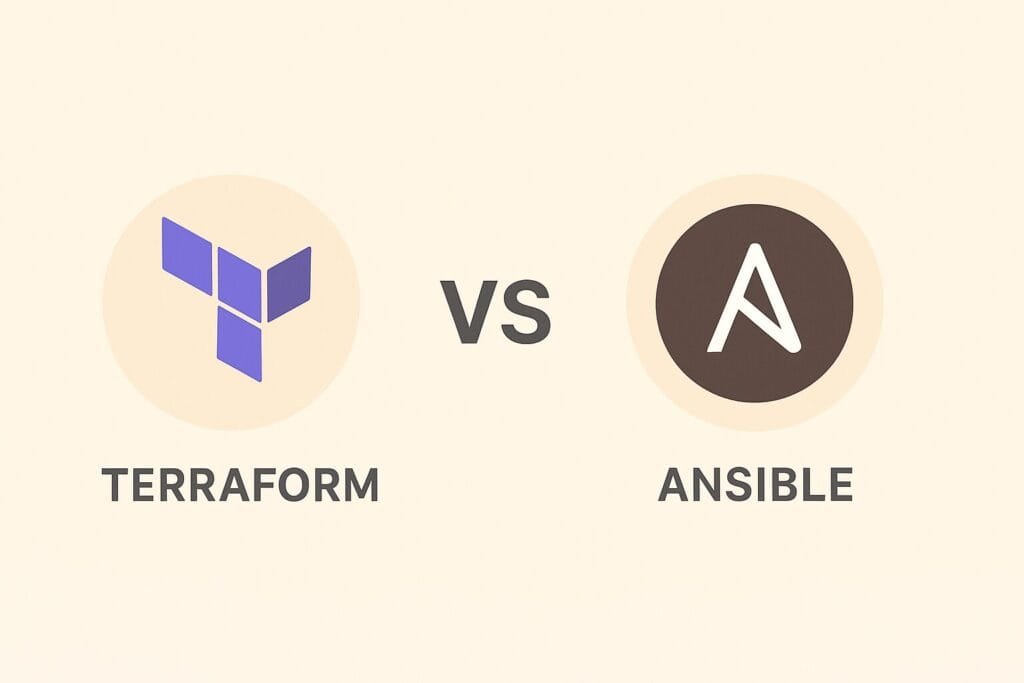In today’s cloud-driven world, infrastructure automation is essential for managing complex systems efficiently. Two of the most popular tools in this space are Terraform and Ansible. Both are widely used for provisioning, configuring, and managing infrastructure, but they serve different purposes and excel in different areas.
In this article, we’ll explore the strengths and weaknesses of both Terraform and Ansible, provide a detailed comparison, and help you decide which tool best fits your project needs.

What Is Terraform?
Terraform, developed by HashiCorp, is an Infrastructure as Code (IaC) tool designed for building, changing, and managing infrastructure in a safe and repeatable way. It uses a declarative language (HCL – HashiCorp Configuration Language) to describe your desired infrastructure state, and then Terraform ensures that the actual state matches the desired state.
- Key Features:
- Declarative syntax (define the end state, not the steps).
- Supports multi-cloud environments (AWS, Azure, GCP, and more).
- State management to track infrastructure changes.
- Idempotent operations (running the same script multiple times yields the same result).
What Is Ansible?
Ansible, created by Red Hat, is an automation and configuration management tool. It uses a procedural, playbook-based approach written in YAML. Unlike Terraform, Ansible focuses on configuration, application deployment, and ongoing system management rather than infrastructure provisioning.
- Key Features:
- Procedural playbooks (define step-by-step tasks).
- Agentless (uses SSH/WinRM, no need for installed agents).
- Great for automating OS-level tasks and application deployments.
- Easy integration with CI/CD pipelines.
Terraform vs Ansible: Side-by-Side Comparison
| Aspect | Terraform | Ansible |
|---|---|---|
| Primary Purpose | Infrastructure provisioning | Configuration management & automation |
| Language | Declarative (HCL) | Procedural (YAML) |
| State Management | Yes, tracks infrastructure state | No state tracking, executes tasks on demand |
| Cloud Support | Multi-cloud and multi-provider | Mainly works with provisioned servers |
| Learning Curve | Moderate, requires understanding IaC | Beginner-friendly with YAML |
| Best Use Case | Creating and managing infrastructure resources | Configuring servers, deploying applications |
When Should You Use Terraform?
Use Terraform if your primary goal is to provision and manage infrastructure across multiple cloud providers. For example, if you want to create AWS EC2 instances, GCP storage buckets, or Azure load balancers, Terraform is the right tool. It excels in defining the desired state of infrastructure and maintaining consistency across environments.
When Should You Use Ansible?
Ansible is ideal for configuration management, application deployment, and automating repetitive administrative tasks. For example, if you want to install software, update packages, configure firewalls, or deploy a web application across multiple servers, Ansible is the perfect choice.
Can You Use Terraform and Ansible Together?
Yes, many organizations combine both tools. Terraform handles infrastructure provisioning (servers, networks, storage), while Ansible manages the configuration and deployment of applications on those servers. This hybrid approach provides end-to-end automation.
Example Use Case
# Terraform: Create AWS EC2 Instance
resource "aws_instance" "web" {
ami = "ami-123456"
instance_type = "t2.micro"
tags = {
Name = "WebServer"
}
}
# Ansible: Configure the EC2 instance
- name: Install Apache
hosts: webserver
become: yes
tasks:
- name: Install Apache
apt:
name: apache2
state: present
External Resource
For further reading, you can visit the official Terraform website to learn more about its features.
Conclusion: Terraform vs Ansible
Both Terraform and Ansible are powerful tools, but they are not direct competitors. Terraform is best for infrastructure provisioning, while Ansible excels in configuration management. If you’re managing multi-cloud infrastructure, Terraform is a must-have. On the other hand, if your focus is on deploying and configuring applications, Ansible is the right choice. In many real-world scenarios, using both together gives the most complete automation solution.

